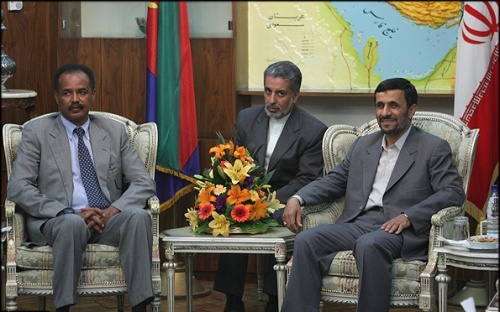IN ADDITION TO THE PERSIAN GULF, FROM ERITREA IRAN CAN CONTROL THE SUEZ CANAL AND ATTACK ISRAEL AND SAUDI OIL FIELDS FROM A DIFFERENT DIRECTION

Eritrean President Isayas Afwerki and Iranian President Mahmud Ahmadinejad
The Eritrean port town of Assab, according to opposition groups, foreign diplomats, and NGOs in the area.
The city of Assab sits at the Horn of Africa in the Arabian Sea. As such, Assab offers a strategic position as the world nervously eyes the precarious routes through which a seaborne oil traverses daily.
Local sources have reported that Iran recently sent soldiers and a large number of long-range and ballistic missiles. The military basing came after Iran signed an accord with Eritrea to revamp the Russian-built refinery used by the Eritrean Oil Company, also known as Assab Oil Company.
As the world’s second largest import of gasoline, Iran is sensitive to a Western plan to obstruct its access to refined product as a part of broad sanctions provoked by Teheran’s nuclear activities.
Iran needs nearby oil refining ability. Using protection of the Eritrean refinery as a pretext, Iran has set up its military operation there, and has been patrolling with unmanned surveillance drones.
In the meantime, the Iranian navy has test-fired a sea-to-sea missile during a six-day naval maneuver in the Sea of Oman. Teheran radio announced, "The surface-to-surface Nasr-2 missile was tested in the (Sea of) Oman operational region,” adding that its new, medium-range missile “was fired from a warship and hit its target at a distance of 30 km (19 miles) and destroyed it."
The latest large-scale naval maneuver covered 50,000 square miles (129,500 sq. kilometers) of Iranian territorial waters and involved about 60 warships. Iran regularly holds war games in the Persian Gulf and the Sea of Oman.
With the addition of a new naval base at Jask at the mouth of the Strait of Hormuz, and new basing at Assab in Eritrea, Iran can exercise a decisive military presence on multiple shores astride the pivotal oil sea lanes.
Iran’s new basing rights trace to last May when Eritrean President Isayas Afwerki visited Iran for a meeting with President Mahmud Ahmadinejad. At a press conference after the meeting, Ahmadinejad declared that the two countries share common views on regional issues and on ways to resist hegemony.
"We've held fruitful talks on different subjects relevant to bilateral ties, mutual investment in the agriculture, industry and energy sectors, and regional and international cooperation," he said.
Ahmadinejad stated that Iran saw “no limits to the expansion of cooperation and relations with Eritrea,” while Isayas hailed Iranian support for Eritrean people. Isayas also commented that both countries will defend rights of each other and of other independent nations.
“I believe regional and international cooperation would guarantee regional peace and stability.”
President Isayas has granted Iran complete and exclusive control over the Eritrean Oil Refinary with the mandate to revamp, manage, and exercise complete authority over production and maintenance of the facility.
Iran will refine its crude oil in Assab to cover shortages it faces at home, which will benefit Eritrea by not having to import expensive refined products.
The Eritrean Democratic Party, an opposition party, pointed to trepidation within the Eritrean regime, indicating that some high-ranking members are saying that the president is playing with fire with Iran and that the consequences for Eritrea could be grave.
In September, Iran and Eritrea signed a memorandum of understanding (MOU) supporting and encouraging foreign investment. The agreement was inked by Iranian Minister of Finance and Economic Affairs Shamseddin Hosseini and his Eritrean counterpart Berhane Abrehe.
Opposition groups in Eritrea are reporting that President Isayas, with the cooperation of some Somali Islamist groups, is going beyond mere bilateral oil supplies, and colluding to control the Bab El Mandeb Straights in case of escalation of conflict with the United States and Israel. Eritrea and the United States backed opposite sides in the war in Somalia, which erupted at the end of 2006.
The ominous expansion of the Iranian military comes at a time when the United States has moved additional naval forces off the coast of Somalia in response to piracy and what appears to be the looming defeat of its U.S.-backed Transitional Federal Government.
Cutting Edge Foreign Editor Joseph Grieboski is President of the Institute on Religion and Public Policy and Secretary General, Interparliamentary Conference on Human Rights and Religious Freedom.




1 comment:
This is what I hate about blogs getting ahead of themselves.
The source of this information is a notorious anti Eritrean government opposition site, with nothing to back it up with.
http://www.eritreadaily.net/News0208/article0811291.htm
Which was picked by and embellished, adding the source as("foreign diplomats, and NGOs in the area")
http://www.thecuttingedgenews.com/index.php?article=980&pageid=37&pagename=Page+One
I find the whole thing dubious, as Eritrea still has full diplomatic relationship with Israel, and even used to allow its Dahlak islands to be used as refuelling stops for the Israeli dolphin class submarines.
Eritrea used to be a staunch ally of America until the Bush administration took Ethiopia''s side in the UN arbitrated border dispute, inspite of the ruling favoring Eritrea, not to mention heavily arming Ethiopia, offsetting the balance of power.
http://www.defenselink.mil/news/newsarticle.aspx?id=42407
http://www.slate.com/id/2178793/
http://www.iht.com/articles/2007/04/08/news/arms.php
Post a Comment